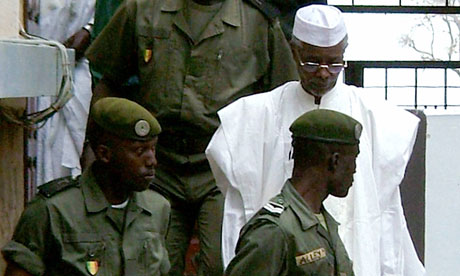By Ryan Aliman
Impunity Watch Reporter, Africa
DAKAR, Senegal – On Tuesday, July 24, 2012, Senegal and the African Union (AU) reached a preliminary agreement on how they intend to try former Chadian dictator, Hissène Habré, who is accused of committing war crimes during his rule from 1982 to 1990.

After four days of deliberations in Dakar, AU and Senegalese government representatives drew a draft agreement on the creation of a special court in Senegal to try Habré. Such “extraordinary African chambers” shall be incorporated “within the Senegalese court structure,” says Amadou Baal, director of the justice minister’s office. The chambers will be divided into four sections depending on their functions, namely, instruction, investigations, trials, and appeals. Each chamber will consist of Senegalese and African judges.
Proceedings against Habré are tentatively scheduled to commence by the end of 2012 according to Senegal President Macky Sall. Baal, however, clarified that the proposal is still subject to final approval.
The deal between the AU and Senegal comes a few days after the International Court of Justice (ICJ) at The Hague, Netherlands, ruled unanimously that Senegal must either prosecute the former dictator for war crimes or extradite him “without further delay.”
The ICJ order was a response to Belgium’s request to prosecute Habré.
A lower court in Dakar has already charged Habré in February 2000, but an appeals court overturned this decision on the ground that Senegalese courts lacked jurisdiction to try crimes that were perpetrated in another country. Belgium, citing the decision of the appeals court as a form of procedural delay, brought the matter to the ICJ and sought to have Habré extradited to face charges in Belgium instead.
Habré ruled Chad for 7 years until he was overthrown in 1990. He was then sent into exile in Senegal.
His regime was marked by repression and systematic targeting of ethnic groups such as the Sara, Hadjerai and the Zaghawa. A 1992 truth commission report said that he presided over up to 40,000 political murders and widespread torture of members of these ethnic groups perceived to be a threat to Habré’s government.
Despite these allegations, Habré has been living a quiet life in the suburbs of Dakar as courts and governments have tussled over who should try him for atrocities.
“Senegal made history in 1999 as the first country to join the International Criminal Court, and it could make history again by being the first country to prosecute the human rights crimes of a foreign leader,” said Alioune Tine, president of the African Assembly for the Defense of Human Rights.
For further information, please see:
Huffington Post – Hissene Habré Trial: Senegal, African Union Reach Deal on Trying Ex-Chadian Dictator – 25 July 2012
All Africa – Chad: Agreement on Habré Court – After World Court Ruling, Plan to Try Chad’s Ex-Dictator in Senegal with African Judges – 24 July, 2012
Star Africa – AU, Senegal Agree on Special Court to Try Habré – 24 July 2012
All Africa – Chad: UN World Court Rules Senegal Must Prosecute Ex-Chadian Leader oe Extradite Him – 20 July 2012
BBC – Profile Chad’s Hissene Habré – 20 July 2012